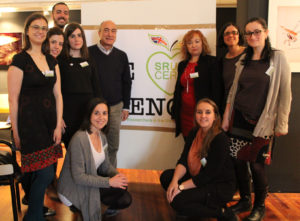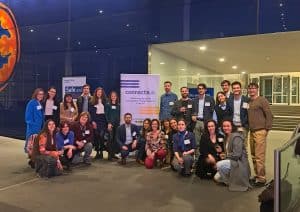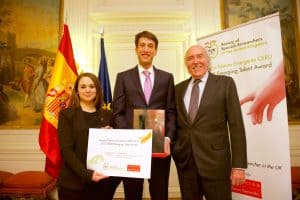“Nanotechnology applications are limited to researchers’ creativity”
- In commemoration of the 5th Anniversary of the Society of Spanish Researchers in United Kingdom (SRUK), the seminar “Nanotechnology and its applications” took place in Manchester, supported by the Ramón Areces Foundation and the Instituto Cervantes.
- The event gathered world-renowned researchers in the field of nanomaterials and their applications: Prof Nazario Martín, Prof Laura Lechuga and Prof Nicola Tirelli.

Manchester, May 6th, 2017. Nanotechnology, commonly known as ‘Tiny Science’, studies the properties of small-sized materials in the range between 1-100 nanometres. The increasing number of applications in medicine and engineering is attracting the interest of researchers and society. With this interest in mind, the Northwest Constituency of SRUK organized the seminar entitled “Tiny Science- The science and applications behind nanotechnology”, mainly funded by the Ramón Areces Foundation. The event brought together world-wide experts in nanomaterials and nanomedicine, such as Prof Nazario Martín (Complutense University of Madrid, Spain), Prof Laura Lechuga (Catalan Institute of Nanoscience and Nanotechnology, ICN2, Spain), and Prof Nicola Tirelli (University of Manchester, UK).
Prof Nicola Tirelli talked about the unmet needs in medicine, highlighting the role of nanocarriers to deliver drugs in specific organs. Despite their potential, he also explained the challenges, such as the truth in the market for nanomedicines: “Nanomedicines are considered drugs, so for a pharmaceutical company their development has the same cost than any other drug development process”.
The great potential in medicine was emphasized by Prof Martín, who focused his presentation in the development and use of novel carbon nanostructures called fullerenes against viral infections, such as Ebola virus. Moreover, he pointed out that nanotechnology is here, and part of our lives, and is gaining momentum. Indeed, in his own words “Nanotechnology is already in the real society”.
Finally, Prof Lechuga explained the relevance of nanotechnology not only in treatment and follow-up, but also in the diagnosis of diseases. For example, how the use of nanodevices (light-based sensors combined with biological receptors) offers novel possibilities in early diagnosis of cancer, allergies or bacterial infections. “Nanomedicine is a unique opportunity to achieve personalized medicine”.
This seminar was held at Instituto Cervantes in Manchester. It was supported by the Ramón Areces Foundation, the Office for Cultural and Scientific Affairs at the Spanish Embassy in London, and the Spanish Foundation for Science and Technology (FECYT).[/vc_column_text][/vc_column][/vc_row]




